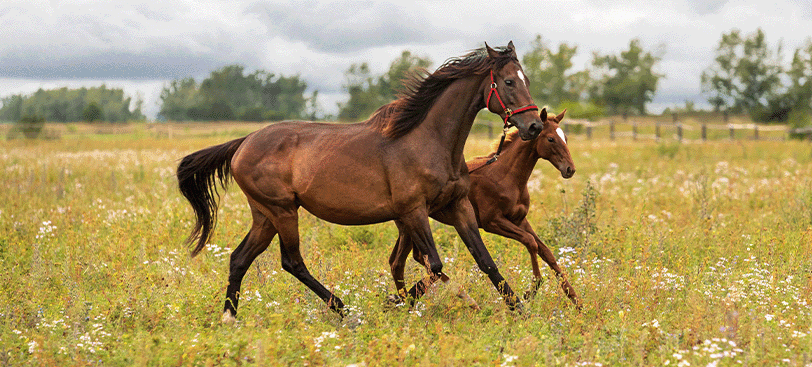
Owning a Horse
Owning a horse is a massive commitment of time and money. The lifespan of a horse is 25 - 30 years, so they play a significant role in your life for a very long time. Having said this...
Horses are emotional and loyal animals, meaning you will be rewarded with many years of joy and friendship.
There is also nothing in the world like the freedom and exhilaration of riding a horse at full gallop.
Born to run - they need space
You may not own a farm, but your horse requires a paddock of at least three acres. It is common to agist horses on properties with other horses. This works well as horses are social animals and will appreciate the company.
Paddocks should be well drained so mud is reduced. They should also have a good cover of grass. Trees and shelter should also be available.
Strong fences are extremely important. Wooden posts and rails are best but if wire is present it should be in good condition (not barbed), and have minimal loose strands.
Ensure there are no poisonous weeds, rubbish, debris, tin sheeting or anything else that your horse is likely to get tangled in. Finally, try to find a paddock close to your home as you should check and feed your horse daily.
Exercise
As long as their paddock is big enough, horses will tend to exercise themselves. However, they can become lazy and gain weight if they’re never ridden.
Make time to ride your horse as often as you can. Ensure you have the correct saddle and equipment as well as protective riding attire, especially a horse riding helmet and smoothed soled boots for riding.
Feeding
Feeding It is difficult to give exact feeding regimes as this varies significantly with your horse’s level of work or exercise, as well as the time of year and pasture or grass quality.
In times of good, lush pastures, supplementary feeding may not be required with horses that are lightly ridden. When pasture quality and grass decreases due to shortage of water (such as in summer), good quality Lucerne or grass hay will be required on a daily basis for your horse to maintain body weight.
Horses with high energy requirements, lactating mares and young growing horses, may require feed concentrates such as pellets and/or grains in addition to pasture and hay.
Extreme care should be taken when a horse (particularly a pony) has been on a high roughage or low energy diet and is suddenly exposed to lush green pasture or grains. A severe and painful foot condition, known as laminitis, may develop.
Water
Horses can drink up to 45 litres or more each day, so always be conscious that your horse has enough water available at all times.
Shelter
Shelter from sun, wind or rain is vital and this could be in the form of a hedge or tight group of trees. If your paddock is rather bare you should provide a shed or stable.
Rugs are also a great form of protection from the elements and every horse owner should ensure they have one, especially if your horse is very young or getting old.
If your horse is rugged, they will need checking every day. Make sure you keep your rugs in good condition and that they’re not making your horse uncomfortable by being too heavy or rubbing and causing sores.
Find a vet
Horses can injure themselves at any time, day or night. Find yourself a good vet who is experienced in handling and dealing with horses.